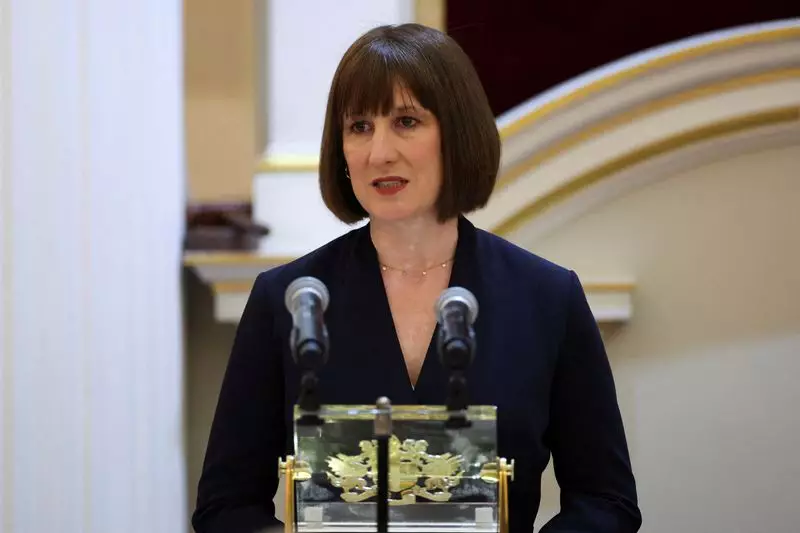In the intricate landscape of global finance, the governance of economic stability poses a formidable challenge for political leaders. In the case of the United Kingdom, current leadership under Prime Minister Keir Starmer and Finance Minister Rachel Reeves is grappling with an array of economic pressures, including surging government borrowing costs and a depreciating currency. As they approach the precipice of a potential financial crisis, influenced significantly by external factors such as US economic policy, their ability to navigate these turbulent waters will determine the future outlook for the Labour government, which has only been in power since July 2023.
The UK financial markets have witnessed a notable downturn in recent weeks, underscored by the rising yields on longer-term government bonds, known as gilts. As of the latest reports, 30-year gilt yields have reached levels not seen since 1998, and the British pound continues to weaken, plummeting to its lowest value since November 2023. These movements in the financial realm have not gone unnoticed, prompting immediate responses from Starmer and Reeves, who assert a strong commitment to rectifying the beleaguered fiscal landscape inherited from their Conservative predecessors. Indeed, blame has been directed at the economic policies implemented post-Brexit and the turmoil triggered by former Prime Minister Liz Truss’s mini-budget crisis. However, Reeves now faces the unenviable task of crafting a path forward.
Reeves has articulated her intentions to pursue a stringent fiscal policy aimed at stabilizing public finances. In discussions surrounding potential spending cuts, there is the looming concern that such measures could provoke backlash from within the Labour Party’s base, which may not take kindly to austerity in any form. The balancing act becomes increasingly complex as the government navigates the sensitive maneuvering required for fiscal discipline without alienating constituents. Moreover, the prospect of raising taxes further complicates the fiscal landscape, particularly as businesses are already reacting negatively to increased social security contributions outlined in Reeves’s previous budget proposal.
This situation prompts crucial questions about the timeframe of economic recovery. While Reeves prepares to address growth in an upcoming speech and plans a comprehensive two-year Spending Review slated for June, most measures proposed thus far are projected to have a positive impact only in the 2030s — a long wait that does little to alleviate current pressures.
Adding an additional layer of complexity, the UK’s economic fate is intricately linked to the policies of the United States. The projected ascent in inflation through potential tariff implementations by President Donald Trump could stifle the global economic environment, thereby exacerbating the UK’s existing challenges. Historically, the UK gilts and US Treasuries have displayed a tendency to move in concert, implying that any alignment of higher borrowing costs in the US directly influences the yields on British gilts. Unfortunately for Reeves’ government, investor sentiment appears measured at best, undermining optimism for a robust recovery.
Moreover, as current account deficits loom large, the UK finds itself increasingly reliant on foreign investment, a situation described by ex-Bank of England Governor Mark Carney as depending on “the kindness of strangers.” However, this dynamic has shifted over recent years, with domestic pension and insurance funds investing less in government debt than in decades past. The volatility of the gilt market, exacerbated by a rise in foreign hedge fund ownership, reflects a more fickle investor base that complicates Reeves’ policy implementation.
As ministers face pressing issues of public borrowing, inflation, and currency fluctuations, the overarching narrative is one of cautious optimism shadowed by significant challenges. Reeves’s attempts to balance fiscal responsibility with the imperative for economic growth require a nuanced approach, rife with potential pitfalls. While financial markets can often react unpredictably to news from abroad, the UK government’s course towards stability rests firmly on both the domestic front and external economic climates.
In the coming months, as Reeves prepares for her upcoming budget and economic strategy presentations, all eyes will undoubtedly be on her leadership. How effectively she manages the myriad concerns surrounding fiscal policy while striving to maintain investor confidence may very well dictate the trajectory of Starmer’s administration. While there are no clear-cut solutions to these intricate economic challenges, navigating the complexities of fiscal strategy in a rapidly evolving global context remains the priority for the UK’s government leaders.

